Associated Press
Brian Witte
February 20, 2018
To help steady its struggling health care exchange, Maryland is considering steps some other states have taken to stabilize insurance markets: revive a sort of insurance for insurers.
State lawmakers held hearings on a variety of health care proposals on Wednesday, including one that calls for what’s known as reinsurance, which protects insurers against very high claims. Sen. Thomas Middleton, a Democrat who is sponsoring the bill, said his measure would create a Band-Aid to secure the individual market this year to keep rates down and lay the groundwork for a long-time solution.
Lawmakers are grappling with serious concerns surrounding the state’s health care exchange after CareFirst BlueCross BlueShield raised rates an average of about 50 percent for plans bought by individuals on the exchange, which is a marketplace for individuals and small businesses to buy health care. Only two health insurance carriers participate in Maryland’s health exchange, CareFirst and Kaiser Permanente. That’s down from a high of eight carriers in 2015.
“We’re looking this year at stabilizing the exchange, because as you know if we don’t do something it’s going to blow completely up,” Middleton said in an interview.
A potential funding source under consideration to stabilize the individual market this year is about $340 million that health insurance companies don’t have to pay in federal taxes this year due to the federal tax overhaul, Middleton said.
Chet Burrell, the president of CareFirst, testified that healthy people are getting out of the individual market, leaving sicker people who cost more to treat and raising rates. He said rates could rise as much as 30 percent next year.
“This is a classic, we think, death spiral in a market where the healthy leave first and the sick remain, because they need the coverage, and in the end the premiums rise steeply and can’t ultimately catch up to what the cost is,” Burrell said.
Middleton’s bill also includes provisions for the state to seek federal waivers for a long-term solution. Four states, Alaska, Hawaii, Minnesota and Oregon, have approved waivers. Three of them are using the waivers to repurpose federal tax credits for reinsurance programs.
The federal Affordable Care Act included a federal transitional reinsurance program for calendar year 2014 through 2016. It was designed to stabilize the market due to an anticipated influx of higher-cost people. While the federal reinsurance program ended in 2016, the U.S. Department of Health and Human Services changed the federal risk adjustment program to include a reinsurance component this year.
Maryland House Speaker Michael Busch , Senate President Thomas V. Mike Miller and Gov. Larry Hogan met Tuesday morning to discuss proposals for stabilizing the state’s health insurance markets.
Mathew Palmer, a deputy legislative officer for Hogan, testified Wednesday the administration was “here to show our support in concept for legislation that will address the pressing issue of health insurance costs in the individual market.”
“The stakes are tremendous, and if nothing is done and a 50 percent increase is allowed to take place it could cause this market to collapse entirely — thousands could lose their health insurance,” Palmer told the Senate Finance Committee.
Al Redmer, Maryland’s insurance commissioner, underscored the need to act.
“I’m convinced that if there is no short-term solution, we’ll never have the opportunity for a long-term solution, because I believe in fact the market will implode if we don’t act and act soon,” Redmer said.
A total of 153,571 people enrolled in private health coverage during the 2018 open enrollment for Maryland’s state-based health insurance marketplace.
A separate measure that received a hearing would create an individual health care mandate at the state level. The federal tax overhaul in Washington ended the requirement. The Maryland proposal would offer people without insurance a choice: pay a tax penalty or use the money as a down payment on insurance. Middleton’s bill included a provision to reinstate an individual mandate, but he said he was taking it out, because his measure to help the health exchange was too urgent to risk any potential political controversy over it.
Last modified: February 22, 2018



